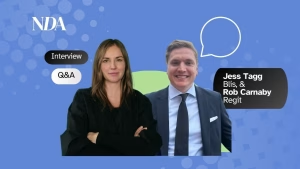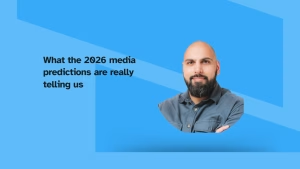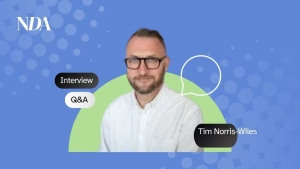NDA’s series, CMO Confidential: Adtech profiles CMOs at leading adtech companies to discover what the CMO role means to them, why it’s needed and what industry trends they are harnessing to drive success. Next up is Ben Kaplan, CMO, Nexxen. With over 15 years’ experience, he has held a variety of leadership roles at companies including PubMatic, X (formerly Twitter) and Meredith Corporation.
Why does an ad tech company need a CMO role?
Advertising technology is key to the immersive, enjoyable consumer experiences we all have and it helps provide durable growth to business stakeholders across the media supply chain. That said, advertising technology is also an incredibly complicated ecosystem.
Even at the highest levels, it is challenging to explain concepts to non-industry family members or friends. When conversations go into areas like real-time bidding, tags and log-level files, the audience’s eyes glaze over.
The CMO acts as the tip of the larger marketing spear to simplify and clarify such complexity, demonstrating the differentiated value the larger organization provides its employees and customers as well as the larger industry. These efforts help provide context to the capabilities, helping facilitate understanding, engagement and value-generation for the business.
What does the CMO role mean to you?
I consider the CMO role to be one of the most rewarding yet complex positions in an organization. There is so much opportunity, with some areas well defined and others possibly quite nebulous. There are three key components that stand out most to me of what the role means:
- Invest in the team who makes the marketing possible within and beyond the organization, acting as a steward for their career growth
- Establish, share and gather enthusiastic alignment around who our brand is and the distinct value we can bring our employees, customers as well as the larger industry.
- Drive a holistic approach across all core marketing disciplines in service of key goals across the funnel: awareness, consideration, conversion and loyalty
How has the CMO evolved over the last 5 years?
The focus on quantitative impact and operational excellence have never been greater. Creativity and ideas are the secret sauce; however, the inability to numerically showcase the results make those efforts like a tree falling in the woods with no one to hear it. Did they really happen?
CMOs must pay attention to and have a plan for how marketing efforts drive results for the business. These results do not need to be revenue-based, as tying marketing actions with 100% correlation to revenue in a B2B context is challenging; yet all efforts should be numerically tracked, contextualized and showcased to objectively demonstrate impact across the marketing funnel.
CMOs, like other leaders, are also pushed to do more with less and maximize efficiency as much as possible. There continues to be a greater focus on operations and optimizations to ensure the execution follows the vision. The best creative insight or idea will fall flat without proper, diligent and thorough execution.
With such wide-ranging responsibilities, how do CMOs keep up with the speed of technological change and the change in customer behaviour it drives?
The road of learning never ends! I think it’s important to embrace what I call a “driver” mentality, constantly thinking about how my team and I can improve. Every day is an opportunity to get better and try something. As it pertains to consumer and technological changes, I try to tap into as much of the external industry and my network as possible.
For the industry, subscribing to the key trades, podcasts and events to be as close as possible to the cutting edge is key. With my network, it is recognizing and taking advantage of garnering insight from anyone at any level. Restricting yourself to certain people, based on where they are or their seniority, limits what you can learn. It is important to not jump on every one thing, but instead focus on the trends and elements repeated across multiple touchpoints. Then you can better begin to see the forest through the trees.
What misconceptions of the CMO role come from the rest of the C-Suite – and how do you overcome them?
Not Nexxen-specific, but the biggest misperception I hear from talking to other marketing leaders is the lack of clarity around what the CMO (and marketing in general) does for the business. The sense is that marketing does “busy work” or “flashy” executions that use company funds but do not deliver much return.
My best recommendation to overcome this misperception is to objectively demonstrate marketing’s impact, through quantitative and qualitative measures. CMOs and their teams should provide these insights within context, demonstrating how they support building the brand and business. Objective, well-positioned performance can help assuage questions around the CMO and larger marketing’s effectiveness.
What technologies at your disposal are you most excited about at the moment in your role?
Not to hop on the hype train, but I am enthralled with generative AI and what it will do to augment the humanity of marketing. Many see generative AI as a threat to their professional livelihood, undercutting or undervaluing marketing efforts. I see it as the testing ground for everything from copy and creative to campaigns and strategies.
I can generate multiple campaign ideas, review image or video mock ups and explore activation options. Ultimately the human should still review and add the elements that make us distinct from machines for the final product. That said, there is so much to explore and learn about how generate AI will enhance business, and more specifically marketing, approaches.
Who is your biggest personal inspiration in our industry and why?
I had the opportunity to work for Jen Wong, currently the COO of Reddit, who continues to be an inspiration around how a leader can be a true change agent. She combines clear vision with a unique ability to simplify the complex, bring others along and leverage data to deliver excellence.
Evolving organizations and navigating change are some of the hardest tasks in business. Whenever she goes, Jen succeeds and makes it look easy. She is someone I continue to learn from and be inspired by.









